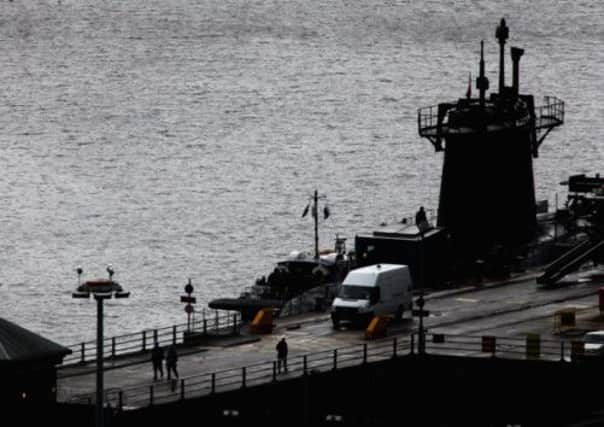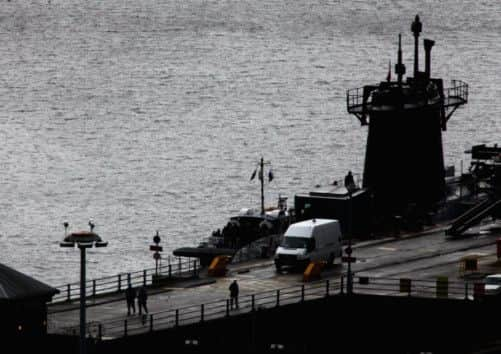Scottish independence: Nato entry ‘not automatic’


And UK Defence Secretary Philip Hammond warned that the United Kingdom could block Scotland’s membership if Holyrood refuses to allow the Trident nuclear deterrent to be based on the Clyde.
Mr Brown and Mr Hammond were giving evidence to the House of Commons defence select committee on the implications of a vote in favour of independence in next year’s referendum.
Advertisement
Hide AdAdvertisement
Hide AdThe SNP agreed at the party’s conference last year to support Scotland’s remaining part of Nato but to oppose nuclear weapons, and ministers have argued that membership would be automatic. In April, First Minister Alex Salmond disputed that Scotland would have to apply to join.


Mr Salmond said: “You have to come to agreement with your colleagues, and in that sense there is a parallel with the European Union – you notify your intent to remain a member.
“We are a member by virtue of our membership of the United Kingdom, and we notify in that period between the referendum and a successful vote, and the adoption of Scottish independence about 18 months later.”
However, yesterday Mr Brown was pressed on whether Scotland would have to apply.
Conservative committee chairman James Arbuthnot said: “Scotland as part of the UK is a member of Nato but you accept that you would need to apply to become a member of Nato. Scotland as part of the UK is a member of the European Union but would not need to apply to become a member of the EU. Is that your position?”
Mr Brown replied: “Yes it is. I think it is very explicable in terms of treaties of the European Union and of the Nato treaties as well and the process by which other countries have joined Nato. We accept and understand that point, we would have to go through that process.”
Earlier, Mr Brown admitted the process could be difficult. Asked by Liberal Democrat MP Sir Bob Russell about Scotland applying to Nato, Mr Brown said: “There are fairly substantial processes to go through but it has been done relatively quickly in the past with some of the eastern European countries.
“I don’t want to give the impression this is an automatic assumption we will go through the processes. It has been done in the past in between 18 and 24 months.”
Advertisement
Hide AdAdvertisement
Hide AdBut Mr Hammond made it clear that the remainder of the UK and other members of Nato could block membership, which requires unanimous agreement.
He said: “The position of the government of the rest of the UK would be one of considered self-interest.
“We would want to look at the defence posture being proposed by the Scottish Government. We would want to look at how much resource they would be prepared to commit to defence of Scotland and a Scottish contribution to Nato.
“We would want to look at their attitude to sharing the burden of common defence platforms including the UK nuclear deterrent which is 100 per cent declared to Nato as a resource to protect the Nato alliance and then reach a decision as to whether having Scotland in Nato would enhance the UK’s defence or detract from it.”
He pointed out that Macedonia and Kosovo are currently both being blocked for “extraneous reasons”.
And he added: “There are countries in Nato which are, for reasons of domestic politics, extremely sensitive to the issue of secession.”
Mr Brown, a former Royal Marine who served in the Falklands conflict, also used his appearance to promise that no Scottish service personnel would face compulsory redundancies post- independence.
His pledge came on the day the government published statistics that 520 military personnel in Scotland out of a total of 11,100 in the UK have been made redundant since 2010.
Advertisement
Hide AdAdvertisement
Hide AdMr Brown said: “Scottish regiments have some of the highest recruitment levels in the British Army, but beyond that we believe we can make it more attractive.
“We could have an agreement whereby there were no compulsory redundancies for people serving within the armed forces during the term of their contract.”
Mr Brown also said that “one airport would be sufficient for Scotland’s needs” pushing back on their previous support for keeping Leuchars in Fife as an RAF base.
He suggested that the historic regimental names lost in previous reorganisations of the army could be brought back by dismantling current battalions and forming smaller units of company size, around 120.
The Scottish minister, who wore a veterans badge during the hearing, also insisted that Scottish military personnel could be trained at army college Sandhurst, the Royal Navy’s Dartmouth college and RAF Cranwell.
However, Mr Hammond said that he could not provide the 200 places Scotland would need and that places would only be offered “on our terms”.
Mr Brown argued that Typhoon aircraft were “beyond the requirements of an independent Scotland”, but then suggested that the UK government could give Scotland extra Typhoons in the independence negotiations.
However, Mr Hammond said that a Scottish Government “will not be able to cherry-pick which assets it wants”.
Advertisement
Hide AdAdvertisement
Hide AdThe Defence Secretary also suggested that defence could be “ringfenced” in any negotiations, preventing its assets being traded against others such as oil reserves.
Mr Brown confirmed that he expects Trident to remain in Scotland after the Scottish Government takes responsibility for defence. He admitted that he has not visited Faslane on the Clyde for about five years and not since he became veterans minister last year.
He also said Scotland would have special forces.
But he was unable to say where contracts would come from to sustain shipbuilding on the Clyde and what would be needed, but said that the rest of the UK could come to an agreement over continuing to build frigates on the Clyde.
This was dismissed by Mr Hammond, who told the committee that the UK pays a premium to build in domestic shipyards and that it would look elsewhere if it goes abroad.
He said: “We can buy [ships] in Spain and Italy at a significantly lower cost than we can buy in the UK.”
He said it would be “very challenging” for Scotland to become a sixth member of the 5Is, the term given to the community of countries including the UK with enhanced intelligence sharing.
Labour shadow defence secretary Jim Murphy said: “The SNP’s defence policy unravels each time they open their mouth and it is little wonder Scotland does not trust the SNP on defence.”
Mundell highlights UK defence links
Scotland Office minister David Mundell welcomed yesterday’s publication of a paper from a London-based think tank on defence and Scottish independence.
Advertisement
Hide AdAdvertisement
Hide AdThe report by the Henry Jackson Society – In Scotland’s Defence? An Assessment of SNP Defence Strategy – said a majority of Scottish personnel were likely to remain in the UK armed forces after independence.
Mr Mundell said: “This report adds to a body of overwhelming evidence from academics that make clear the defence and security benefits for Scotland that come from being part of the UK.
“Those who want Scotland to leave the UK must spell out what benefits disintegration of our armed forces could possibly have on our levels of security.”